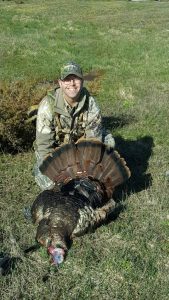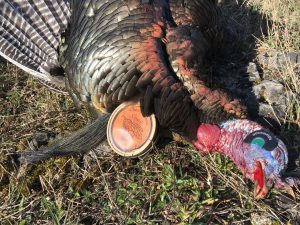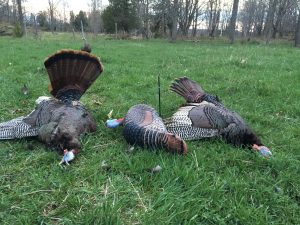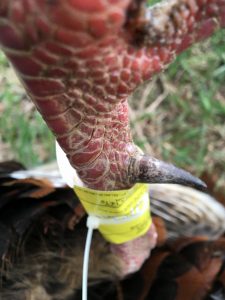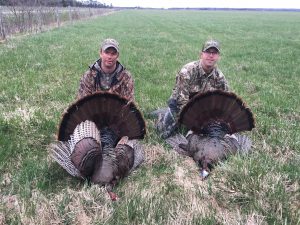I stood in the dark staring into the empty vacuum of my van interior. I said bad words as I realized that I had not brought my turkey vest, or any decoys, on this particular trip. Panic temporarily set in, and I jogged into the farm house, accusingly asking my wife if she had brought them in without my knowledge. I then tried to passively blame her and the kids, before settling on ultimately flaying myself for the gross oversight in packing.
I swore and got grumpy. I had never turkey hunted without a vest, and I was emotionally invested in having all of my gear and giving a good account of myself in my role of pseudo-guide the upcoming morning. For a split second I considered texting Brian (a.k.a. Tack) and telling him that I was out for the morning. I mean what good would I be without a comfortable seat, a full suite of decoys, and my full arsenal of very expensive turkey calls? Rummaging through my hunting box I found an old box call, a facemask, camo gloves, and two mouth calls.
It would have to be enough.
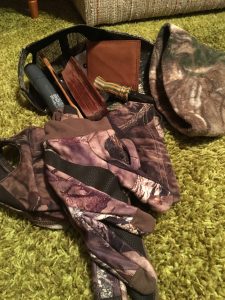
At 4am I snuck out of bed and put on my camo. I was tagged out so I was going to be the designated guide and gear carrier for this trip. Without vest, gun, decoy or calls, I was feeling very under-prepared when I slid out the door and waited for Tack. I caught a bit of a chill as I stood in the lane and quickly snuck back inside to grab my coat, and as I exited I could see Brian’s headlights coming up the county road. We made for a nearby field where birds had been frequently seen, and snuck to our spot. On our way in I had owl-called and the notes echoed hauntingly around the dead-calm of the hardwoods.
Nothing answered, and we hastily set out two hen decoys before settling into the undercover of a gnarly old crabapple tree. It was 5:10am and the previous night’s moon, which was just past being full, shone silver on the field edges around us. Songbirds started up, and then a lone goose powered past, clucking loudly. Eventually we heard a bird gobble from the property we had crossed through to get to our setup. Then another, and then two more. Tack swore silently that we had walked past the birds on our way in. Two properties over to the south another, unexpected, bird fired off a lusty gobble.
We were surrounded.
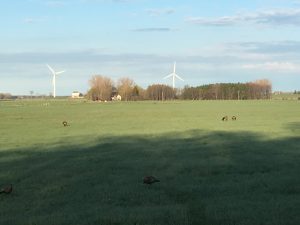
To that point we had not heard a hen yelp, but soon we heard a very distinctive old girl start her morning rasping. I began to call softly myself in response, before cranking it up and matching her note for note. All the while the gobblers worked to a frenzy and they must have hammered a hundred times or more. The noise did not dissipate when the birds hit the ground, but rather the hen grew more aggressive, while another jenny started calling more casually from a position directly behind us.
A couple of deer sauntered into the picture and the sun began to shine bright and strong. The bird to the south seemed to be lonesome and he drilled gobble after gobble in response to the cacophony going on around us. It was more gobbling than I may have ever heard on a spring morning, and I could sense that I had a big stupid grin on my face the whole time. That I was sitting on the cold, dewy ground without a plush cushion didn’t really matter at that point.
Eventually we called the hens into the setup, and they pulled their three boisterous suitors in with them, but we were stunned to be confronted with three strutting jakes. They all had full gobbles, but they lacked full tailfans so we gave them a pass.
Sneaking out the way we had entered, we decided to head north for a run and gun tour.
While Tack filled his truck at the local gas station, he had a sudden change of heart, and suggested we slip south of Lion’s Head and check out a place he had not hunted yet in 2017. I was up for anything, and we cruised down Bruce Road 9. We pulled into the property and to the north I saw the telltale dark shape of a turkey crossing a field.
“There a turkey right there.” I said and Tack applied the brakes. As he did I saw two more turkeys trailing behind. Tack put the binoculars on the trio and then turned back to me, with a big grin and happy eyes.
“Three longbeards…and they’re alone.” It was music to my ears.
The birds were headed from west to east into a series of hardwood ridges interspersed with grassy fields, and we sped ahead before parking the truck and putting a sprint on through the woods to get ahead of the birds’ anticipated route. Halfway to where we wanted to be I looked to the left and at twenty-five steps a big doe whitetail deer was watching us sneak past. She never snorted or stomped and we crouch-walked into position. We crested a bit of a hill and Tack grabbed the sleeve of my jacket and yanked hard.
“Shit. They just saw us,” he hissed. Sure enough I could see a red-headed gobbler trotting away. I could also see the two other birds, and they were still acting as though nothing was amiss, so we sat down and I started doing some soft calling and scratching in the leaves for about fifteen minutes, before I made a series of crow calls.
The birds said nothing.
Then a truck drove down the county road and all three hammered out gobbles. I slowly stood again and could see that they were closer and making their way towards out setup. Tack whispered that there was a trail up ahead that went to a water hole and he remarked casually “I betcha they’ll be on that trail.” Part of me wanted to move ahead to the trail edge but I also did not want to have the longbeards bust us while we moved, so we stayed pat. Five minutes later, I was softly calling and scratching in the leaves, when again Tack hissed at me.
“SHAWN…in front of us.”
As Brian had expected, all three birds were on the bush trail and they were trying to get around behind us. Both Brian and I froze, and the birds filtered past, with one big gobbler strutting the whole time, drumming loudly as he went by. Another bird broke off and closed to less than twenty steps, with his head glowing neon white and fire-engine red, but he was on the wrong side for Brian to ease into a shooting position. In a few moments, all three toms eased off down the ridge and I slowly stood up once they were out of sight. We quickly commiserated on a new plan of attack when suddenly all three of them gobbled in unison without provocation. Knowing the lay of the land, we sprinted in a circle ahead of them again and deployed Brian’s one lone hen decoy. I then dropped over a ridge and quite literally sat in a rock hole before I started calling once again. This time the birds cut me off with thunderous gobbling.
I cutt hard on the call and ran a series of fast yelps and again the birds interrupted me angrily. The tone of their gobbles had changed and there seemed to be a searching urgency in their calls now. They were coming off the ridge we had last heard them on and they were closing the distance rapidly. Three more times I called and every time they hollered back frantically. One last time they screamed without even giving me the courtesy of asking them to do so. Seconds later I was startled by the bark of Tack’s Winchester. I stood and heard Tack let out a rowdy “WOOOOO!!” and I hollered one back at him. Brian was striding to the downed bird, and I excitedly hurdled my way over the ridge, because I wanted to get a better look at the gobbler.
“PACE THAT OFF!” Brian shouted, and I did at a very conservative forty-five steps. A bit of a long shot, but the bird had never even flopped.
Getting to the bird we engaged in the usual shouts of congratulations and high-fives and man-hugs that always go down in accordance with tradition. Brian told me how they had come down off the ridge and hung up at the field edge, and he described how when two of them had gotten wary and started to slide away, he let slide at the strutter who had lingered in the open just a bit too long for his own health. Tack had trusted his gun and it did not let him down.
We tagged the bird and I played gear-mule for the decoy and Brian’s shotgun, since he had the responsibility of over twenty pounds of feathers, spurs, and meat to sling over his shoulder. It was a solid 3-year-old bird, with one-inch spurs and a thick paintbrush beard to go along with weighing in at a very respectable twenty-one pounds.
For my part, as much as I enjoyed the satisfaction of being there for Brian’s second bird of the spring, and as much as I was ecstatic about the way the hunt itself played out, I learned valuable lessons about patience, woodsmanship, and the art of travelling light. Because sometimes, in the turkey woods, it’s true that less can be more.

